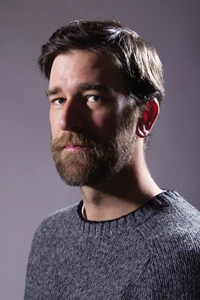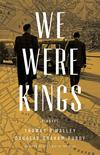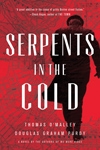We Were Kings (37 page)
Authors: Thomas O'Malley

FROM THE GALWAY
docksâwhere so many doomed coffin ships, their lower bellies stuffed with starving, cholera-sick Irish, had sailed for Boston and New York, St. John's and New Brunswick, a hundred years beforeâthe hearses traveled west, past the Spanish Arch and Nimmo's Pier, and along the shore road.
Beneath gray, churning skies and sudden squalls of wind-whipped rain, they passed through Spiddal and into Connemara. At Rossaveal they turned inland toward the distant Maamturks and the wide, empty plains of bog.
In Bealadangan, the General, Sean Mullen, signaled the driver to take a right onto a bitumen-gravel boreen, rutted tire tracks on either side of a high, grass-covered slope, and the two cars wound their way upward through Muckinagh, black and dun bogs covered with pale, rain-engorged gorse and heather falling away on either side.
They passed a barrow-shaped hill upon which a narrow cross angled skyward crookedly and a lone farmhouse, peat smoke twining upward from its chimney. At the sound of the motor, a head poked from the open half-door, looked at them for a moment, a halo of smoke from a pipe cursed out into the rain, and then retreated. They were in Connemara now and the Galway men had little time for the locals, just as the locals had little time for them.
They rounded a bend, the hearse's springs squealing in distress, and the house slowly disappeared from view. Now they were surrounded on all sides by bog and rock and mist-shrouded mountains.
“Here,” the passenger said, pointing at a gate, and the driver pulled in, leaving room for the second hearse behind, and the front-seat passenger stepped out. He opened the gate and the two cars entered an overgrown cart path that led to a courtyard attached to a crumbling cow byre and a long-abandoned laborer's cottage, its whitewash faded and moss growing upon the slate roof where one of the corner eaves had collapsed in on itself.
Their boots sinking in cow shit and bog water, the four men hefted the coffins out of one hearse and then the other, laid them on the mossy droim that fell away to the bog. Three bullocks stared balefully at them from over a stone wall and lowed their discontent at the intrusion. The big fellow with the black watch cap glared back at them. “Shut the fuck up,” he muttered angrily, the cold mist already turning his mouth stiff.
It began to rain, as it had off and on during their journey west. From the Atlantic, winds pushed black-gray squalls across empty fields; the wind whipped at their clothes and the rain lashed the coffins, banged on the metal roofs of the hearses. Using the casket key, one man slowly cranked and opened each casket until the top was free from the seal and then they pried all the tops back. For a moment they stared unblinking through the rain at the bodies lying in three of the four coffins, and then as the smell struck them they stepped back. They looked at the men they'd sent to Boston four weeks before, rain spattering their blue-black facesârigor had long ago left them and after almost two weeks at sea, decay had bloated the bodies and filled the coffins with putrefying gases.
“The fuckers,” one of them muttered.
“Check for the guns,” the General said.
The men wrapped their mouths in kerchiefs and reached into the coffins. Gagging, they pulled and pushed the weighted bodies aside, the soft flesh sinking and seeming to melt under their touch. “Ah, Jesus,” one said, “his bleedin' arm is coming off.” They burrowed beneath the cadavers, faces pressed close to their rotting comrades, and then yanked their hands free. The big fellow tore the kerchief off his face and shook his head in disgust.
“Fucking Boston,” the General said, and stepped forward, grasped an edge of one coffin, and, grunting, overturned it. The men watched as it crashed down the rocks, shattered, and spilled into the bog. Slowly it began to sink. The bog took the coffin, and the upper torso of the dead soldier, Fitzgerald, rolled out, and then both slipped beneath the surface. The General looked until the coffin and the body were gone. Rain slid down his face and he blinked as it ran into his eyes. “Do the same with the rest of the coffins,” he said.
“What about the bodies?”
“Fuck the bodies,” he said. “Let the bogs have them. And when you're done with that, make sure and wire Boston.”
A curlew cried out somewhere over the bogs, lonesome and melancholy. Cows moved slow and brooding at the edge of the sphagnum. The smell of the rotting bodies still hung in the air. He turned to them, squinting through the rain, and said, “Tell them the Irish are coming.”
With gratitude and love to my wife, Jennifer Purdy, and to my daughter, Colette Gráinne, two of the most precious blessings in my life.
âThomas
 Â
To Marlynn, my rock and my muse. I don't know where I'd be without your kind, generous soul.
âDouglas
 Â
We'd both like to thank the team over at Mulholland Books / Little, BrownâJoshua Kendall and Garrett McGrathâas well as our agent, Richard Abate.
Â
Normand Purdy for his love and support.
 Â
And to the city of Boston, which always continues to inspire our imaginations.

Thomas O'Malley
is the author of the novels
In the Province of Saints
and
This Magnificent Desolation
. A graduate of the University of Massachusetts, Boston, and the Iowa Writers' Workshop, he is currently the Director of Creative Writing at Dartmouth College. He lives in the Boston area.
 Â

Douglas Graham Purdy
is a graduate of the University of Massachusetts, Boston, and currently lives in Brooklyn. This is his second novel.
To receive special offers, bonus content, and news about our latest ebooks and apps, sign up for our newsletters.
Or visit us at
hachettebookgroup.com/newsletters
The characters and events in this book are fictitious. Any similarity to real persons, living or dead, is coincidental and not intended by the author.
Copyright © 2016 by Thomas O'Malley and Douglas Graham Purdy
Cover design by Lauren Harms
Cover photographs by Bert Brown/Getty Images; Historic Map Works LLC/Getty Images
Cover copyright © 2016 by Hachette Book Group, Inc.
Author photographs by Rick Dorrington (O'Malley) and Kevin Joseph Laccone (Purdy)
Hachette Book Group supports the right to free expression and the value of copyright. The purpose of copyright is to encourage writers and artists to produce the creative works that enrich our culture.
The scanning, uploading, and distribution of this book without permission is a theft of the author's intellectual property. If you would like permission to use material from the book (other than for review purposes), please contact [email protected]. Thank you for your support of the author's rights.
Mulholland Books
Little, Brown and Company
Hachette Book Group
1290 Avenue of the Americas, New York, NY 10019
mulhollandbooks.com
twitter.com/mulhollandbooks
facebook.com/mulhollandbooks
First ebook edition: June 2016
Mulholland Books is an imprint of Little, Brown and Company, a division of Hachette Book Group, Inc. The Mulholland Books name and logo are trademarks of Hachette Book Group, Inc.
The publisher is not responsible for websites (or their content) that are not owned by the publisher.
ISBN 978-0-316-32351-2
E3-20160502-DA-NF

